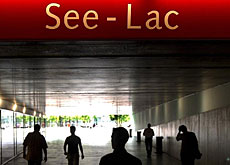Language law failure leaves cantons speechless

Cantons and lobby groups have condemned a government decision to shelve legislation aimed at protecting Switzerland’s four main languages.
The government blamed a lack of funds, claiming it could not afford the SFr17 million ($13 million) needed to implement measures set out in the draft law.
Switzerland has four national languages, German, French, Italian and Romansh, a Latin-based dialect spoken by only 0.5 per cent of the population.
The new law was designed to maintain the country’s distinctive multilingualism at a time when it is coming under pressure from English.
“The decision gives out a negative signal, especially in relation to recent discussions in Switzerland about the position of the national languages and English,” said Gabriela Fuchs, spokeswoman for the cantonal education authorities.
English
The controversy over the growing prominence given to English in the country’s schools heightened last month.
Cantonal education directors decided that all primary schools must teach at least two foreign languages – including English – from 2012.
Most German-speaking cantons are expected to start teaching English before the national language, French. But in a majority of the French-speaking cantons, German would continue to be given priority.
Fuchs says the new law would have strengthened the position of the national languages, as it would have supported minority languages and bilingual cantons such as Valais, Fribourg and Graubünden.
The legislation also envisaged language exchanges between schoolchildren and teachers from different linguistic regions, as well as the creation of a national centre of competence for languages.
Fuchs’s view is backed by lobby groups promoting Romansh and Italian. They recently released a statement appealing for more support for both languages.
Like the cantonal education authorities, they have called on the government to reconsider its decision.
Duty
According to supporters of the legislation, the government has a duty to sustain the national languages because of an article in the constitution.
But government spokesman Achille Casanova disagrees.
“The government realises that it has a constitutional mandate [for the national languages], but it is of the opinion that this constitutional article is fulfilled by the instruments and activities already in place,” he told swissinfo.
To fund the measures contained in the legislation, the government needed to find an extra SFr17 million from 2008.
“The numerous measures in the draft law would have led to the government paying extra subsidies at a time when federal finances are already in a critical situation,” said the interior ministry in a statement.
Both the cantonal education authorities and lobby groups say they have not given up hope.
Support from parliament could lead to the draft law being debated there – an option that even Casanova does not discount.
“And if both chambers [of parliament] agree on a motion or a parliamentary initiative, then the government would support the law,” he said.
swissinfo
The law would have cost SFr17 million and would have supported minority languages, bilingual cantons, exchanges and a national centre for languages.
But cabinet shelved the law last month, citing financial reasons. It also feels that it is meeting its mandate for the national languages.
Cantons and lobby groups are disappointed, but they hope that parliament might intervene.

In compliance with the JTI standards
More: SWI swissinfo.ch certified by the Journalism Trust Initiative











You can find an overview of ongoing debates with our journalists here . Please join us!
If you want to start a conversation about a topic raised in this article or want to report factual errors, email us at english@swissinfo.ch.